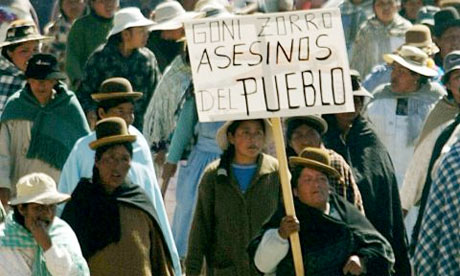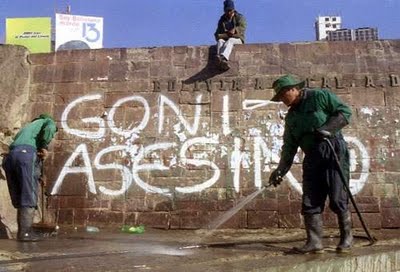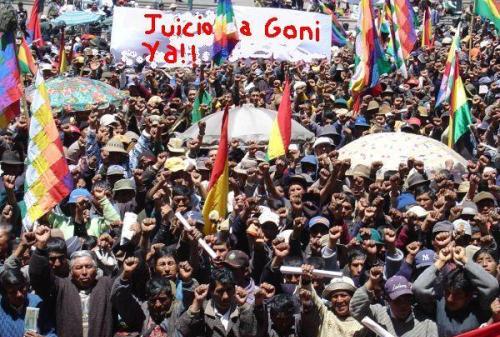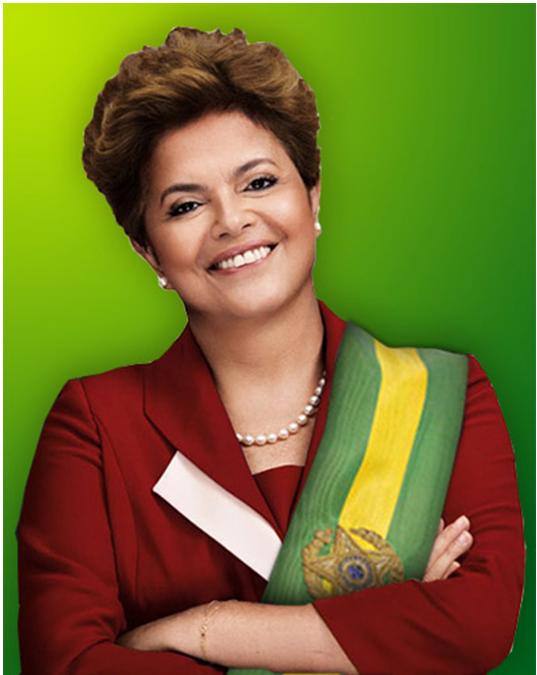Latin America
Related: About this forum"Our Brand Is Crisis" - Greenberg Carville Shrum in Bolivia, America's Backyard.
Another prime example of why the long-documented US position that "Latin America is our backyard" is so offensive and being rejected.
Cascadiance posted about a documentary that just knocked my socks off. We read about these things, we document them, we know it happens, but this documentary provides an inside look of the process.
In 2002, among the many creepy roles of James Carville was his work as strategist at Greenberg Carville Shrum (GCS), when the political consultancy firm he had helped to found went to work to help Gonzalo Sánchez de Lozada (nicknamed “Goni”) win the hotly contested presidency of Bolivia. Although they thought the man to beat was Manfred Reyes Villa, the mayor of Cochabamba, certainly the one who most worried Washington was the indigenous leader, Evo Morales. But, what kind of choice was Sanchez de Lozada? According to BBC News, (Oct. 18, 2003), “The US-educated millionaire mining magnate, who speaks Spanish with an American accent, is nicknamed ‘gringo.’” He was hardly the most enlightened choice to make president of a country whose population consists largely of Quechua- and Aymara-speaking Indians (of whom Morales is one), who have been deeply impoverished by centuries of autocratic rulers allied to U.S. policy-makers and to foreign capitalists who have profited handsomely from Bolivia’s rich mineral resources (silver, tin, oil, gas). But, Sanchez de Lozada had previously been Finance Minister and, then, president from 1993 to 1997. He had worked closely with the World Bank and IMF and had miles to go on behalf of international capitalism. He had aggressive neo-liberal plans. None of this would have been news to the boys from GCS. They made their choice knowingly. Never mind matters of conscience or principle.
And, of course, as a bonus, securing a victory for Sanchez de Lozada would prevent Morales (not initially a leading contender) from becoming a president who intended to reverse the perverse legacy of 500 years that had made Bolivians among the poorest people in the world. That wouldn’t be James Carville’s idea of progress. So, Greenberg Carville Shrum put their money on –well, got paid to support—Sanchez de Lozada. It’s all captured in Rachel Boynton’s 2006 film, Our Brand is Crisis. Reviewing it in New York Magazine, David Edelstein put his finger on a key issue: “The problem,” he wrote, “is that the blinkered patrician Goni doesn’t have the know-how to fix a stopped toilet, much less a country on the verge of economic collapse, with a disenfranchised indigenous majority howling to be recognized.” This was the man whose candidacy Carville and his associates championed, rather than Evo Morales, whose election the Bush administration was passionately opposed to. (Four days before the election, U.S. Ambassador to Bolivia, Manuel Rocha, urged Bolivians not to vote for Morales –because he was associated with “drug dealers and terrorists”– or the U.S. might cut off aid.)
Despite the work of Carville and his colleagues, the election results were very close. Sánchez de Lozada got just over 22 percent of the vote, while Morales came in second with 20.9 percent, 721 ahead of Reyes Villa. This required the Congress to appoint the winner and, given its composition and with the Bush administration threatening to isolate Bolivia if it allowed Morales to win, Sanchez de Lozada took office in August 2002. He, then, predictably, embarked on a broad policy of free-market development that included plans to export natural gas to the United States through a deal with powerful multi-national corporations.
...
But, that’s not surprising. Democracy Corps is a really nice name, but it is actually indistinguishable from another Carville effort, Greenberg Quinlan Rosner, a polling and consulting firm of which Stan Greenberg is the Chairman and Chief Executive Officer and which Carville also co-founded. The headquarters of Democracy Corps and Greenberg Quinlan Rosner are the same: 10 G Street, NE Suite 500, Washington, DC 20002. GQR describes itself, on its website, as “the world’s premium research and strategic consulting firm,” and, as such, has a predictably eclectic bag of clients. These include a few nice guys like Comedy Central. But, among its powerful corporate clients are: BP, Boeing, Allegheny Power and Monsanto. Nothing non-profit about this side of the Suite 500. They also, according to their web-site, “served as Sanchez de Lozada’s consultant on polling and strategy, and helped develop Sanchez de Lozada’s winning campaign message.” In their own words, they were “part of the GCS consortium of campaign consultants.” The 2002 Bolivian election was one of those “which side are you on” moments. Carville and his cronies chose to side with Lozada and the proverbial dust-bin of history.
...
http://open.salon.com/blog/eric_ross/2009/05/23/telling_bolivia_who_to_vote_for_james_carville_associates
Excellent article below. The snips don't do it justice.
Obama justice officials have all but granted asylum to Sánchez de Lozada – a puppet who payrolled key Democratic advisers
By Glenn Greenwald
guardian.co.uk, Sunday 9 September 2012

In October 2003, the intensely pro-US president of Bolivia, Gonzalo Sánchez de Lozada, sent his security forces to suppress growing popular protests against the government's energy and globalization policies. Using high-powered rifles and machine guns, his military forces killed 67 men, women and children, and injured 400 more, almost all of whom were poor and from the nation's indigenous Aymara communities. Dozens of protesters had been killed by government forces in the prior months when troops were sent to suppress them.
The resulting outrage over what became known as "the Gas Wars" drove Sanchez de Lozada from office and then into exile in the United States, where he was welcomed by his close allies in the Bush administration. He has lived under a shield of asylum in the US ever since.
...
The view that Sánchez de Lozada must be extradited from the US to stand trial is a political consensus in Bolivia, shared by the government and the main opposition party alike. But on Friday night, the Bolivian government revealed that it had just been notified by the Obama administration that the US government has refused Bolivia's extradition request:
"'Yesterday (Thursday), a document arrived from the United States, rejecting the extradition of people who have done a lot of damage to Bolivia,' leftist [President Evo] Morales, an outspoken critic of US foreign policy in Latin America, said in a speech.
"Calling the United States a 'paradise of impunity' and a 'refuge for criminals,' Morales said Washington turned down the extradition request on the grounds that a civilian leader cannot be tried for crimes committed by the military …
"Sanchez de Lozada's extradition was also demanded by opposition leaders in Bolivia and they criticized the US decision.
"Rogelio Mayta, a lawyer representing victims of the 2003 violence, said 'the US protection' of Sanchez de Lozada was not surprising.
"'It's yet another display of the US government's double moral standard,' he said."
...
The former leader – a multimillionaire mining executive who, having been educated in the US, spoke Spanish with a heavy American accent – was a loyal partner in America's drug war in the region. More importantly, the former leader himself was a vehement proponent and relentless crusader for free trade and free market policies favored by the US: policies that the nation's indigenous poor long believed (with substantial basis) resulted in their impoverishment while enriching Bolivia's small Europeanized elite.
...
http://www.guardian.co.uk/commentisfree/2012/sep/09/america-refusal-extradite-bolivia
limpyhobbler
(8,244 posts)Catherina
(35,568 posts)I wish I had the gift of doing it "lite" like some better posters here. I'm sorry it's so heavy and long. I'm looking forward to your comments.
limpyhobbler
(8,244 posts)I saw that movie some years ago but I wasn't as politically aware then, so I'm going to try watching it again probably.
Catherina
(35,568 posts)I thought I was politically aware a few years ago but moving to Latin America, and seeing these things close up, is a rude awakening.
When you see old, broken people still walking for miles, carrying heavy loads, in their bare feet as multinationals swoop in stealing their labor and their resources for profit, it enrages you if you have a conscience.
I have yet to hear a good explanation of why hungry peasants need to pay tribute to corrupt multinationals and subsidize their million dollar salaries. Instead I hear pretty words like "freedom of the press", "democracy", "human rights" but only when those can be twisted to the advantage of the profiteers.
So I watched it this morning with real anger in my heart for all the faceless people these profiteers couldn't care less about. And that includes US citizens who are fast becoming faceless.
limpyhobbler
(8,244 posts)I guess as a medical student he took a trip around South America. He saw the suffering of the people. Supposedly it really opened his eyes.
Catherina
(35,568 posts)It's my dream to do something similar one day. Did you read the book or see the movie? I noticed it's back up on youtube so I'm going to watch it again now lol.
limpyhobbler
(8,244 posts)Motorcyle Diaries. One of my favorite movies. I don't know how realistic it is.
Starry Messenger
(32,342 posts)marking to watch later too.
Catherina
(35,568 posts)It was fascinating, for me, to see how casually those jerks, well here, Madfloridian and Matt Stoller say it better than I can:
by Matt Stoller, Tue Mar 21, 2006 at 12:19:25 PM EST
I saw a film called Our Brand is Crisis last night, and it was stunning. It's the story of American political consultants that go into Bolivia in 2002 to help elect a neoliberal President Goni, an American-educated stubborn elitist who is clearly out of touch with the urgent needs of his desperately poor country. In an earlier term as President, Goni had sold out the country's ample natural resource base, and was pushing for tighter IMF solutions that were clearly bankrupting the country. The consultants, who fancy themselves progressives, see this as neoliberal fantasy playcamp and strive to get Goni elected over what they see as 'irresponsible' populist candidates who don't in fact want Bolivian industry sold to foreigners. The consultants are successful in the election, able to split the various candidate supporters running on a populist line through a nasty negative campaign. Goni wins with an appalling low plurality of 21% of the vote, and then 14 months later he resigns amidst riots that kill 100 people.
What is remarkable about the film is the behind-the-scenes look at how these guys operate. The firm is the Greenberg Carville Shrum group, and their cynicism and arrogance is laid bare as they use modern American marketing tools to play God in a country about which they clearly know nothing. Their notion of democracy is a nasty greedy slugfest of ads and media spin, and when it doesn't work because the people in Bolivia know that Goni would be a bad leader, they turn negative. The rationalizations turn these guys and the filmmaker into moral pretzels, as they talk about how democracy is embedded into American DNA while it just doesn't seem to take route among Bolivians. This of course despite the focus groups where Bolivians are telling them that they don't like Goni because he is anti-democratic and won't listen to the people."
Now, I'm a political guy, not a film critic, so my I'll leave most of the cinematic critique to Jane. For my money, though, I actually had to look a bit for these conclusions, because the filmmaker, Rachel Boynton, doesn't understand the story she told. Her access was amazing, but she was 'in the tank', having succumbed to the bullshit that the Greenberg Carville Shrum group pumped out as much as Goni did. She never did touch on the real source of Goni's weakness, which was a moral cowardice reflected in the poverty and violence he clearly cared so little about. To her, Goni was trying to do the right thing, and so were all the consultants, and so she tried to impute some false nobility to their enterprise. Fortunately, she fails, and the film can't help but tell a real story, a human story, of delusional power mad individuals who are at the end of the day quite banal, and quite dangerous."
http://www.democraticunderground.com/discuss/duboard.php?az=show_mesg&forum=132&topic_id=3031874&mesg_id=3032557
Judi Lynn
(160,483 posts)after he fled Bolivia to avoid responsibility for having politically murdered Bolivian citizens.
[center]~~~~~ [/center]

~snip~
The vice-president of Bolivia, Alvaro García, declared to Radio Fides that these candidates, without any definite platform, “want to confront Evo Morales at the polls, but with money from a man responsible for the deaths of 68 persons and 40 wounded” in the political repression of October, 2003.
“These candidates, who are the residue of that same administration, only want to return Sánchez de Lozada to power,” said García.
García Linera made these statements during a meeting with miners, in which he revealed that Germán Antelo, candidate for the Nationalist Revolutionary Movement (MNR) is one of those candidates.
The election of Antelo, a doctor who currently presides over the politico-business organization, the Comité Pro Santa Cruz, the most radical of the anti-Evo opposition movements, has caused a schism in the MNR.
Vice-President García Linera also identified the leader of the New Republican Force (NFR), the recalled ex-prefect of Cochabamba, Manfred Reyes Villa, who was an ally of Sánchez de Lozada when he ordered the massacre of protesters in El Alto, October 2003.
cont'd
More:
http://www.sabinabecker.com/2009/07/bolivia_evil_exile_goni_is_fin.html
[center]~ ~ ~ [/center]
Bolivia - an eyewitness account
solitage - forwarded from a-infos newswire. | 16.10.2003 19:42 | Social Struggles
13/10/2003 - 12.30pm A human tide, coming from El
Alto, is already in the centre of the capital La Paz. They
hurry towards the Palace. Marching through the streets near
government headquarters, more rebels appear, residents of the
area, adding to the march, with clubs and stones. It is the people,
humiliated and massacred with machine guns and rifles
for more than 48 hours. It is the people that has decided to
kick out the government of millionaire Gonzalo Sánchez de Lozada.
The neighborhoods of the north, of the east and of the
west are already in the hands of the people. In the city
centre, at the government's headquarters, workers, unemployed and
students control the main streets, awaiting the arrival of the
residents of El Alto before occupying the Praça Murillo, home to
the Government's vast Palace, protected by a ring of fire
and machine guns.
The military, heavily armed, are holding on to the
symbol of power. The president, a recluse in his official
residence in the South of the city, is alone and desperate, meeting
with those ministers who still back him. Journalists already
speculate on his dismissal, which seems imminent.
The human tide continues to move forward. Everone is
screaming, everyone is furious. Some say that there are 20,000 -
others calculate more than 30,000. But it is certain that are
more than ever intent on avenging the massacre, they cannot
forget the 30 plus who have died and the 150-odd wounded in the last
48 hours.
From the city of Oruro, in El Alto, the padrecitos of
the Church bless a countless crowd of shopkeepers, workers,
miners and students who have decided to march on La Paz, leaving
behind their children, their brothers and sisters, to remove
Sánchez de Lozada.
More:
http://www.indymedia.org.uk/en/2003/10/279042.html
[center]

~ ~ ~ ~ ~[/center]

Published on Tuesday, October 14, 2003 by the Latinamerica Press
Bolivia in Crisis over Plan to Export Natural Gas to US
LA PAZ, BOLIVIA -- Bolivia's government is in a state of crisis after four cabinet ministers resigned and the vice president denounced the government for using excessive force to quell demonstrations over the export of the country's natural gas to the United States and Mexico.
Two people were killed in clashes between protestors and police in the capital, La Paz, Monday, but dozens of people have died in recent weeks as nonstop protests have been met by force from police and soldiers.
Although President Gonzalo Sanchez de Lozada refused to resign, he announced today that he will postpone plans to build the gas pipeline, at least until next year.
It started with a peaceful march of thousands in major Bolivian cities on Sept. 19. Since then, the gas war has pushed Bolivia one of Latin Americas poorest countries, into a violent confrontation between marginalized classes and the right-wing government that hopes to sell natural gas to the United States.
More:
http://www.commondreams.org/headlines03/1014-05.htm
Judi Lynn
(160,483 posts)Article from 2008:
Bolivia: Enron and separatism
Tuesday, 10 June 2008, 12:31 am
Column: Tortilla con Sal
Bolivia: Enron and separatism
by Andrés Soliz Rada, Rebelión, June 9th 2008
The decision of the Transredes company (the Shell -Ashmore group that took over from Enron) to hand over the expansion of their Villamontes gas pipeline to the departmental prefecture of Tarija, bypassing central government, demonstrates yet once more how that company has promoted the break-up of Bolivia, an issue of world interest. Faced with that situation President Evo Morales did the very least he could do, namely, decree the compulsory purchase by the State of the hydrocarbons transport company shares.
Thus Enron's presence seems to come to an end. Both under its own name and under its successor's it became a byword for corruption in Bolivia. Remember that when Enron declared bankruptcy on December 2nd 2001 it was described as one of the most corrupt businesses ever in the far-from-clean history of the United States. Enron came to Bolivia under the patronage of (then president) Gonzalo Sanchez de Lozada so as to accelerate the liquidation of Yacimientos Petrolíferas de Bolivia (tr., the State hydrocarbons company). Within months of taking office in 1994, Sanchez de Lozada, in July of that year, signed a memorandum of understanding with Enron to build a gas pipeline from Bolivia to Brazil.
Petrobras, (tr., Brazil's State oil company) tried to push Enron out of the deal by announcing it would fund the work's US$300m cost. Sanchez de Lozada refused to accept the loan, arguing that it was impossible to pay it back. Petrobras answered by saying it would accept payment in natural gas. At that moment. Sanchez de Lozada replaced YPFB, which ought to have become the owner of the gas pipeline on national territory, by the US company.
Enron, then turned itself into part of Transredes, paying for corrupt decision making. Since, Sanchez de Lozada was in the United States, The aymara Vice President, Victor Hugo Cárdenas, issued the decree authorizing the illegal contract with the company. YPFB's top executives turned up working for Petrobras. The Hydrocarbons Superintendent, Carlos Miranda, failed to insist on the installation of a gas liquefaction plant which left Brazil the beneficiary of free additional liquifiable gas. No protest was heard from the YPFB board which included the economist Gonzalo Chavez. Transredes loaned out one of its directors, Carlos Kempff Bruno, to serve as one of Jorge Quiroga's ministers, getting him back later.
More:
http://www.scoop.co.nz/stories/HL0806/S00122.htm
[center]~ ~ ~ ~ ~[/center]
We still only know slivers of a story which should have been public knowledge so long ago, which our own corporate media opted to downplay completely, leaving us all in the dark, as always, even though it clearly involves, has involved this country, and this country's government moving behind the scenes for ages.
Catherina
(35,568 posts)You first brought this to our attention but it deserves a repost:
By Brian Mier 2 hours ago
An announcement was made last Thursday that David Axelrod had been hired to work on the 2014 Brazilian presidential campaign. According to the Brazilian daily Folha de São Paulo, Axelrod and Los Angeles mayor Antonio Villaraigosa have signed on to help develop an electronic strategy for the candidate Aécio Neves.
The idea of US citizens working on Brazilian election campaigns is nothing new. During the last election, Ben Self, who worked on the Obama campaign, was hired as a consultant for current president Dilma Rousseff. The unusual thing about David Axelrod coming to Brazil is that he is a major player in the US Democratic Party working for the conservative opposition candidate running against a president whom Obama has openly praised in the past.
Aécio Neves is a member of Brazil’s political elite. His father and grandfather were congressmen during the military dictatorship that ruled in the country between 1964 and 1985. During the junta, student associations and opposition political parties were outlawed. Many members of the current ruling PT (Partida de Trabalhadores, or “Workers’ Party”), including current President Dilma Rousseff, were arrested and tortured during this dictatorship. Neves’s grandfather, Tancredo Neves, was handpicked by the military to be the first new civilian president and died mysteriously a few days before the inauguration. Neves was the governor of Minas Gerais state from 2002 to 2010. During this period, he implemented an austerity program called Management Shock and was involved in a series of corruption scandals, most notably an influence-peddling scandal known as Mensalão. Corruption has rarely been an impediment to being elected to public office in Brazil, however, and the charismatic Neves continues to be the main hope for the conservatives in the next presidential election.
It’s difficult to summarize the complicated constellation of Brazilian politics briefly, but Neves is running for president as a multiparty coalition candidate of the two largest parties in Brazil, PSDB and Democratas. Democratas traces its origins back to ARENA, the government political party during the neofascist military dictatorship that ruled Brazil from 1964 to 1985. Former president Fernando Henrique Cardoso founded PDSB, the Social Democrat Party. Cardoso was a progressive intellectual from the 70s who swung sharply to the right after becoming president in 1994. During his eight-year tenure, he followed a monetarist economic prescription handed to him from the IMF and kept inflation down by suppressing wages, maintaining the world’s highest interest rates, and privatizing key sectors of the Brazilian economy.
More:
http://www.vice.com/read/david-axelrod-is-advising-brazils-conservative-presidential-candidate
Judi Lynn
(160,483 posts)On edit, adding:
What's even harder to think about, his boss, President Obama, took his wonderful family with him when he went for a meeting with President Dilma Rousseff in Brasil earlier, and it appeared they were all such good friends. Now hos guy stabs Dilma in the back by working for the fascist right.
That's really an insult to US American Democrats, as well as all the people who love Dilma in Brasil.
[center]

 v
v
David Axelrod

Dilma matters in this life, in this world.[/center]
Dawson Leery
(19,348 posts)Obama is on good terms with Rousseff.
In the end, Axelrod is a shyster, no better than Karl Rove.